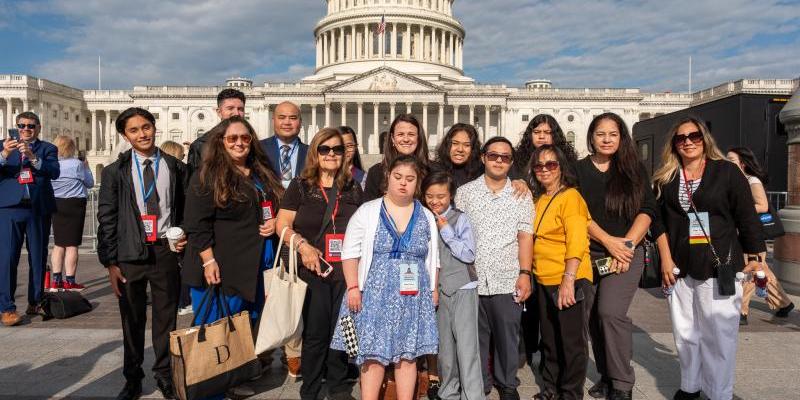
April 11, 2022: The Down Syndrome Coalition, along with our colleagues from the Down Syndrome Diagnosis Network (DSDN), Down Syndrome Medical Interest Group-USA (DSMIG), International Mosaic Down Syndrome Association (IMDSA), and National Task Group on Intellectual Disabilities and Dementia Practices (NTG), and in partnership with our self-advocates and families, succeeded in removing discriminatory language from an important healthcare coverage determination that would have excluded people with Down syndrome from clinical trials for a new class of Alzheimer’s treatments. With more than 1,800 individual comments submitted by the Down syndrome community, this community’s voice was too loud to ignore, and we are one step closer to our goal of making sure adults with Down syndrome have equitable access to treatment options for Alzheimer’s disease. The next phase of our collective advocacy must be focused on supporting the inclusion of people with Down syndrome in clinical trials for Alzheimer’s treatments.
View the Coalition Response to CMS
Last summer, the FDA approved a new drug called aducanumab, one of the first treatments meant to address the cause of Alzheimer’s disease and the first in a new class of treatments. In January 2022, The Centers for Medicare & Medicaid Services (CMS) proposed a plan that excluded people with Down syndrome and other intellectual and developmental disabilities. While we don’t yet know the extent to which this class of drugs will benefit individuals with Down syndrome, we want to make sure they have every opportunity to receive the best possible treatments now and into the future.
February 4, 2022: Down Syndrome Affiliates in Action (DSAIA), Down Syndrome Medical Interest Group (DSMIG-USA), GiGi’s Playhouse Down Syndrome Achievement Centers, Global Down Syndrome Foundation (Global), LuMind IDSC Foundation (LuMind IDSC), National Down Syndrome Congress (NDSC), National Down Syndrome Society (NDSS), and National Task Group on Intellectual Disabilities and Dementia Practices (NTG) collaborated to catalyze a community-wide response to the draft decision. Because of how significant the impact of Alzheimer’s disease is on our community, it’s critical that we come together and share a common message to combat this discrimination and protect our community’s access to treatment for Alzheimer’s disease.
To learn more, you can view the recording of a recent Webinar hosted by LuMind IDSC and NDSS for Down Syndrome Affiliates in Action.
View NDSS’ initial comment to CMS
WHY ALZHEIMER’S DISEASE IS A CRITICAL ISSUE FOR THE DOWN SYNDROME COMMUNITY
The critical link between Down syndrome and Alzheimer’s disease is genetic. Because the amyloid precursor protein that is the basis for Alzheimer’s disease to occur is present on chromosome 21, people with Down syndrome, who have three copies of chromosome 21 instead of two, are at a higher risk for developing Alzheimer’s disease. In the real world, people with Down syndrome have a 90% chance of developing Alzheimer’s disease. They will see the onset of these symptoms earlier in life than members of the general public, and, once they do, they will experience a faster progression of the disease.
On January 11th, CMS proposed to cover aducanumab under a Coverage with Evidence Development (or CED) framework. Part of that CED protocol excludes people with Down syndrome and other intellectual and developmental disabilities entirely. This exclusion from coverage now will have both short- and long-term negative effects on our community because aducanumab is a breakthrough treatment, and the CED is meant specifically to help develop evidence of the drug’s effectiveness. If CMS moves forward with this exclusion, whatever evidence might be developed, none of it will apply to our community, and people with Down syndrome will be no closer to gaining covered access to a safe Alzheimer’s treatment. Instead, our community will be farther away than everyone else. As new developments are made based on the health outcomes of aducanumab, that gap will only widen.







